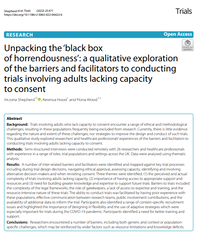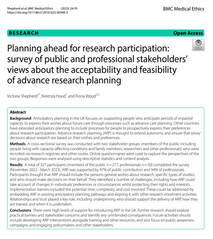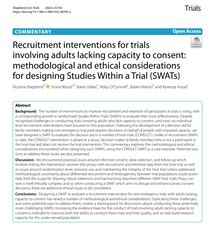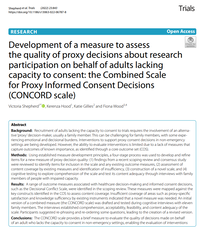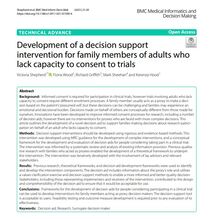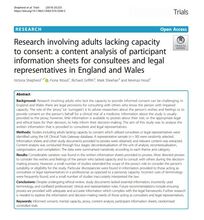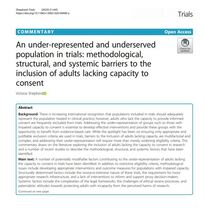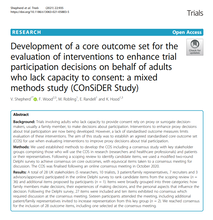This page collates recent papers from the CONSULT project and other relevant publications around the inclusion of adults with impaired capacity to consent.
Please let us know about any other useful publications to include using the Contact page.
Please let us know about any other useful publications to include using the Contact page.
Journal articles from CONSULT
|
|
Other recent relevant publications
Ageing and dementia
Consent recommendations for research and international data sharing involving persons with dementia
Feasibility of a human factors work-system designed recruitment method for hospitalized persons with dementia
Misfitting the Research Process: Shaping Qualitative Research “in the Field” to Fit People Living With Dementia
Older person's and their caregivers' perspectives and experiences of research participation with impaired decision-making capacity: a scoping review
Partnering with older people as peer researchers
Uncertainties When Applying the Mental Capacity Act in Dementia Research: A Call for Researcher Experiences
Nothing About us Without us: Research Methods Enabling Participation for Aged Care Residents Who Have Dementia
Methods and approaches for enhancing communication with people with moderate-to-severe dementia that can facilitate their inclusion in research and service evaluation: Findings from the IDEAL programme
Supporting Inclusion and Participation for People Living With Dementia: Ethnographic and Participatory Research Methods
A human rights-based framework for qualitative dementia research
Care homes
Older care-home residents as collaborators or advisors in research: a systematic review
How nurses can support the inclusion in research of older people who lack capacity to consent
Conducting a Randomized Controlled Trial in Care Homes: The Challenges of Recruiting Residents Who Lack Capacity to Consent
Supporting autonomy of nursing home residents with dementia in the informed consent process
How nurses can support the inclusion in research of older people who lack capacity to consent
Conducting a Randomized Controlled Trial in Care Homes: The Challenges of Recruiting Residents Who Lack Capacity to Consent
Supporting autonomy of nursing home residents with dementia in the informed consent process
Critical care
Effectiveness of participant recruitment strategies for critical care trials: A systematic review and narrative synthesis
Perspectives Study: Guidance to inform recruitment and consent in studies involving critically ill patients
Strategies to enhance recruitment and consent to intensive care studies: a qualitative study with researchers and patient–public involvement contributors
Guidance to inform research recruitment processes for studies involving critically ill patients
Perspectives Study: Guidance to inform recruitment and consent in studies involving critically ill patients
Strategies to enhance recruitment and consent to intensive care studies: a qualitative study with researchers and patient–public involvement contributors
Guidance to inform research recruitment processes for studies involving critically ill patients
End of life and palliative care
Learning disabilities
Mental capacity to consent to research? Experiences of consenting adults with intellectual disabilities and/or autism to research
Participatory research with men with learning disability: informed consent
Process evaluation in intellectual disability research: A case study and the need for adaptation of frameworks
Supporting informed clinical trial decisions: Results from a RCT evaluating a digital decision support tool for those with intellectual disability
Voiceless subjects? Research ethics and persons with profound intellectual disabilities
Participatory research with men with learning disability: informed consent
Process evaluation in intellectual disability research: A case study and the need for adaptation of frameworks
Supporting informed clinical trial decisions: Results from a RCT evaluating a digital decision support tool for those with intellectual disability
Voiceless subjects? Research ethics and persons with profound intellectual disabilities
Legal frameworks
A systematic review and narrative synthesis of the research provisions under the Mental Capacity Act (2005) in England and Wales: Recruitment of adults with capacity and communication difficulties
Lost Voices in Research: Exposing the Gaps in the Mental Capacity Act 2005
The UK Mental Capacity Act and consent to research participation: asking the right question
Inclusion of adults with conditions that have the potential to affect capacity and or communication in research: triangulation from a mixed-methods study of current practice and values across multiple stakeholders
Lost Voices in Research: Exposing the Gaps in the Mental Capacity Act 2005
The UK Mental Capacity Act and consent to research participation: asking the right question
Inclusion of adults with conditions that have the potential to affect capacity and or communication in research: triangulation from a mixed-methods study of current practice and values across multiple stakeholders
Public involvement
Aphasia
MENTAL CAPACITY ASSESSMENT


